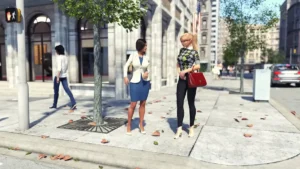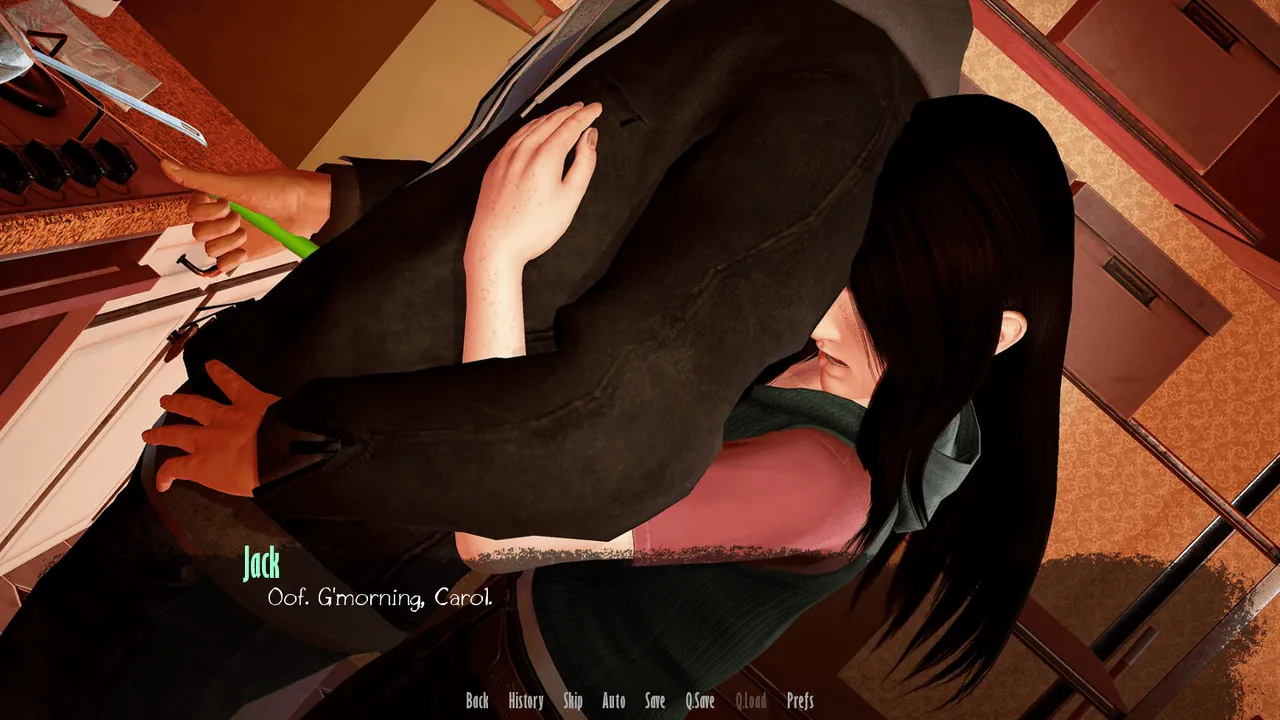
Jessica O’Neil’s Hard News
Play Jessica O’Neil’s Hard News
Jessica O’Neil’s Hard News review
Master the investigative journalism experience with strategic choices and character development
Jessica O’Neil’s Hard News is a story-driven visual novel that immerses players in the world of investigative journalism. You take on the role of Jessica, a determined 25-year-old reporter transitioning from local television to harder-hitting investigative work. This interactive experience puts you in control of her career trajectory, forcing you to make pivotal decisions about ethics, methods, and ambition. Whether you’re drawn to narrative-rich games or fascinated by journalism-themed entertainment, this guide explores everything you need to know about navigating Jessica’s challenging journey to establish herself as a credible voice in the industry.
Understanding the Game Mechanics and Gameplay Experience
How Decision-Making Shapes Your Story
You know that moment when you’re playing a game and you hit a major choice, your cursor hovering over the options while you mentally calculate the fallout? 😅 In Jessica O’Neil’s Hard News, that feeling isn’t just a momentary pause—it’s the entire heartbeat of the experience. The Jessica O’Neil’s Hard News gameplay is built on a sophisticated visual novel decision-making system that truly makes you feel the weight of being an investigative journalist. Every dialogue option, every source you decide to trust, and every ethical line you consider crossing directly carves out your unique path.
I remember my first playthrough, facing a seemingly simple choice early on: do I publish a sensitive tip about a local politician from an anonymous source, or do I hold the story to verify it further? 🤔 I went with my gut and published, chasing the headline. Big mistake. That single decision alienated a key police contact for the rest of that playthrough, locking me out of crucial information for a later, much bigger case. It was a brutal but brilliant lesson in cause and effect. This is the core of the narrative branching choices; they aren’t just about good or evil, but about professional integrity, speed versus accuracy, and building a reputation.
The game’s interface makes tracking these decisions intuitive. You’re constantly presented with clear dialogue trees and action prompts, but the long-term consequences are often beautifully hidden. The story progression system is like a web, where tugging on one thread in Chapter 2 might make an entire section of the web collapse or strengthen in Chapter 5. You’re not just picking a pre-determined “path”; you are actively writing the story with every interaction.
Pro Tip: Don’t try to metagame on your first run. Play authentically as the journalist you would want to be. You’ll be surprised by the unique story you create, and subsequent playthroughs become even more rewarding as you explore the roads not taken.
To give you a clearer picture of how these ripples effect the entire game world, here’s a breakdown of some common early-game decisions and their potential long-term impacts:
| Your Decision | Immediate Consequence | Long-Term Story & Relationship Impact |
|---|---|---|
| Publish an unverified scoop for a quick career boost | Gain immediate notoriety and a temporary reputation increase with your editor. | Lose trust with key police and political contacts. May be denied access to critical press conferences or official statements later. |
| Protect a source’s identity under pressure | Face short-term professional scrutiny and a temporary setback on a related story thread. | Gain a deeply loyal contact who provides exclusive, game-changing tips in the final act. Your reputation for integrity soars with other potential sources. |
| Share information with a rival journalist | Get a piece of information you need to progress your current investigation. | Your rival breaks a major story you were building, damaging your standing at the newspaper. Alternatively, they may become a powerful ally if your relationship is managed carefully. |
| Confront a subject aggressively in an interview | Potentially force a quick confession or a revealing slip-up. | The subject’s entire organization (business, family, etc.) becomes hostile, closing off peaceful interview opportunities and creating new antagonists. |
Understanding this visual novel decision-making system is the first step to mastering how to play Jessica O’Neil’s Hard News. It teaches you that in journalism, as in life, there are rarely perfect answers—only choices and their consequences. 🗞️➡️🌳
Character Development and Relationship Tracking
If the decisions are the heartbeat, then the characters are the soul of this game. Jessica O’Neil’s Hard News features a deep character relationship tracking system that goes far beyond a simple “like/dislike” meter. Every person you meet—from your grizzled editor and eager intern to your confidential sources and skeptical subjects—has their own memory of your interactions, and they will absolutely hold you accountable for them. 👥
Your relationship with each character is visualized through a dynamic bio page that updates with notes like “Appreciates your discretion” or “Feels you were overly confrontational in your last meeting.” This isn’t just flavor text; it directly impacts the investigative journalism game mechanics. A source who trusts you might call you with a hot tip out of the blue. An official you’ve annoyed might “lose” your press pass application.
Let me give you a real scenario from my second playthrough that perfectly illustrates how a single choice can cascade. Early in the game, you meet Police Chief Miller, a no-nonsense figure who is initially wary of the press. 🚔
- Choice A: I chose to challenge him publicly during a press conference about a stalled investigation, questioning his department’s competence. It felt good in the moment—I got a juicy quote for my article.
- The Cascade: This single action had a butterfly effect. Chief Miller’s status on my relationship page immediately shifted to “Hostile.” For the next several in-game weeks, the police department’s PR unit stonewalled my information requests. Later, when a major corruption scandal started to unfold, my colleagues who had maintained a better relationship with Miller were getting background whispers; I was completely in the dark. My entire approach to that storyline had to change—I had to find shakier, underground sources, which introduced new risks and ethical dilemmas.
This is the power of the narrative branching choices when intertwined with character bonds. The game made me feel the direct cost of burning a bridge. It’s a constant balancing act between getting the story and maintaining the professional network you need to survive. Your character relationship tracking isn’t about making everyone love you; it’s about strategically managing your reputation to keep doors open for the stories that matter most.
The Jessica O’Neil’s Hard News gameplay loop brilliantly integrates this. You’ll find yourself:
* Choosing your words carefully during interviews to build rapport or apply pressure. 😊 vs. 😠
* Deciding whom to spend your limited time with—grabbing a coffee with a contact might reveal a personal detail that becomes a key piece of evidence later.
* Navigating office politics with your fellow reporters and editor, which can affect your assignment quality and resources.
Mastering this social web is not an optional side activity; it is a core investigative journalism game mechanic. Your notebook may be full of facts, but your contacts are what bring those facts to life.
Investigation Mechanics and Story Progression
Now, let’s get into the meat and potatoes: the detective work! 🕵️♀️ The investigative journalism game mechanics in Jessica O’Neil’s Hard News are designed to make you feel like a real reporter, not just a passive viewer of a story. You are the one connecting the dots, and the game gives you a fantastic toolkit to do it. The core of the story progression system is gated by your own curiosity and diligence.
The game presents you with a sprawling case file that acts as your hub. Here, you’ll manage leads, cross-reference evidence, and map connections between people and events. It’s not just a glorified quest log; it’s an active workspace. You might have a dozen leads at once, but only by following the right threads will you uncover the truth.
The core activities that define how to play Jessica O’Neil’s Hard News are:
- Conducting Interviews: This is more than picking dialogue options. You need to read body language (beautifully conveyed through character sprites and descriptions), decide when to show a piece of evidence to provoke a reaction, and know when to push harder or back off. A successful interview can break a case wide open.
- Research and Fact-Checking: ✍️ You’ll spend time at the public archives, scour through old newspaper databases, and verify every claim. Publishing a falsehood has severe consequences for your credibility and can even lead to legal trouble, making this a tense and critical mini-game in itself.
- Surveillance and Fieldwork: Sometimes the story isn’t in an office. You’ll tail subjects, take covert photographs (using an in-game camera mechanic), and gather physical evidence from locations. These segments add a wonderful layer of immersion and tension.
The Jessica O’Neil’s Hard News gameplay brilliantly incorporates ethical dilemmas directly into these mechanics. I once had a source hand me a sealed private document. The narrative branching choices here were stark: Do I open it and use the information, potentially violating privacy laws but exposing a huge scandal? Or do I respect the seal and return it, upholding my ethics but possibly letting a corrupt official walk free? There is no “correct” answer in the menu; the game respects you enough to let you make the call and live with the outcome, which could range from a Pulitzer nomination to a lawsuit.
Your progress is measured not by an experience bar, but by the depth of your understanding and the strength of your published work. The story progression system is organic. You might hit a wall in your investigation, and the only way forward is to revisit an old contact with a new piece of evidence or take a risk on a dubious lead. This mimics the real, often frustrating, but ultimately rewarding process of investigative journalism. 🏆
Ultimately, the magic of Jessica O’Neil’s Hard News is how it all connects. Your character relationship tracking opens up new investigative avenues. Your success with the investigative journalism game mechanics influences how characters perceive you. And the entire experience is framed by a visual novel decision-making system that ensures no two stories are ever the same. It’s a game that demands you be thoughtful, persistent, and brave—just like a real journalist.
Jessica O’Neil’s Hard News delivers a compelling interactive experience that goes beyond typical visual novel storytelling by grounding itself in realistic journalism challenges and meaningful decision-making. The game’s strength lies in its ability to make players genuinely consider the ethical implications of their choices while pursuing an engaging narrative. Whether you’re interested in exploring different career paths for Jessica, uncovering all possible story branches, or simply enjoying a well-crafted narrative experience, understanding the game’s mechanics and systems enhances your engagement. The interconnected nature of decisions and consequences means each playthrough offers a unique perspective on Jessica’s journey. For players seeking a narrative-driven game that challenges your moral compass while delivering entertainment, Jessica O’Neil’s Hard News provides hours of compelling gameplay with significant replay value.












